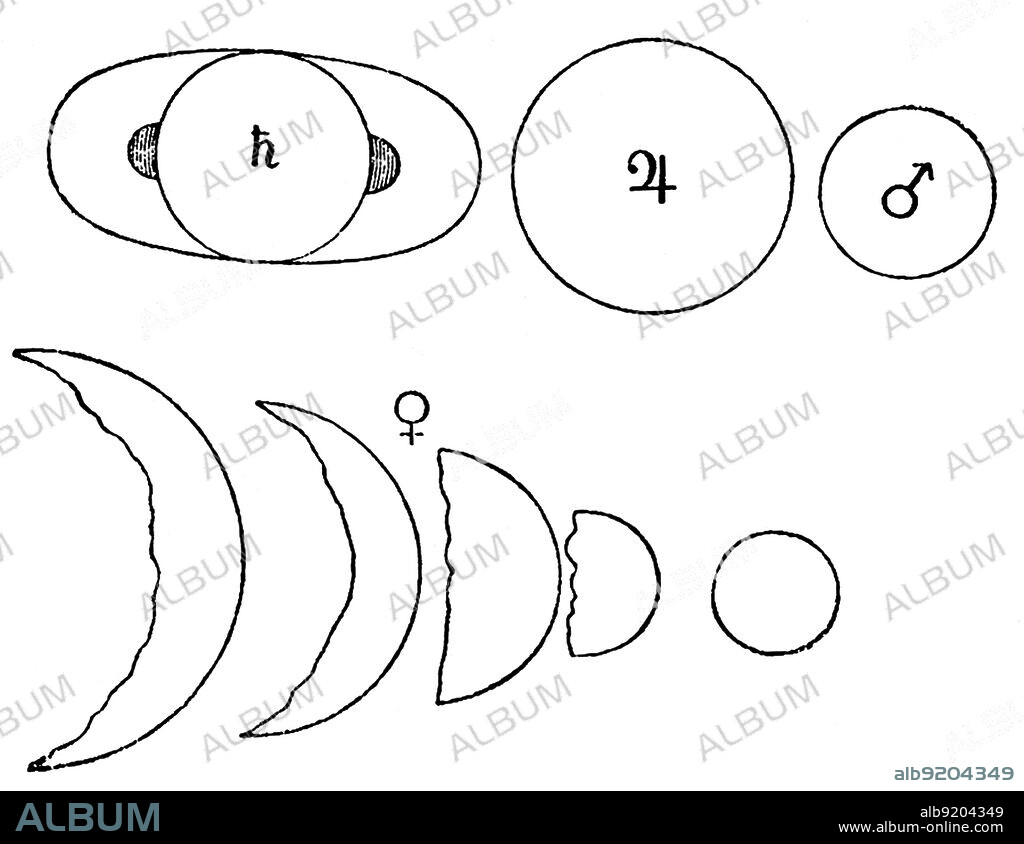alb9204349
Galileo, Phases of Venus and Other Planets, 1610

|
Add to another lightbox |
|
Add to another lightbox |



Buy this image.
Select the use:

Title:
Galileo, Phases of Venus and Other Planets, 1610
Caption:
Phases of Venus and Other Planets, January 1, 1610. Galileo Galilei's observations that Venus appeared in phases in our sky -- similar to those of Earth's Moon -- was evidence that Venus orbited the sun and contributed to the downfall of the centuries-old belief that the sun and planets revolved around Earth. Also sketched here are Jupiter, Saturn and Mars. Galileo Galilei (February 15, 1564 - January 8, 1642) was an Italian physicist, mathematician, astronomer, and philosopher who played a major role in the Scientific Revolution. His achievements include improvements to the telescope, important astronomical observations and support for Copernicanism. Galileo has been called the "father of modern observational astronomy", the "father of modern physics", the "father of science", and "the Father of Modern Science". In 1610 he became the first person to use a telescope to make astronomical observations. He supported the Copernican theory that the Sun was at the center of the solar system rather than the Earth, but this belief was judged heretical by the Inquisition in 1633 and he was sentenced to house arrest for the rest of his life.
Credit:
Album / NASA/Istituto di Linguistica Computazionale / Science Source
Releases:
Model: No - Property: No
Rights questions?
Rights questions?
Image size:
Not available
Print size:
Not available
Keywords:
1610 • 17TH CENTURY • 17TH • 1ST • 2ND • 4TH CENTURY A. C. • 4TH CENTURY A. D • 4TH CENTURY A. D. • 4TH CENTURY AC • 4TH CENTURY AD • 4TH CENTURY • 5TH CENTURY BC • 5TH CENTURY • 5TH • 6TH CENTURY A. D. • 6TH CENTURY • APHRODITE • ART • ASTRONOMY • BODY • BW • CELESTIAL • CENTURY • CYTHEREAN • FIFTH • FOURTH CENTURY A. D. • FOURTH CENTURY • FOURTH • GALILEI • GALILEI, GALILEO • GALILEO • GAS • GIANT • HEAVENLY • ILLUSTRATION • ILLUSTRATIONS • JANUARY • JC5340 • JUPITER • OTHER • OUTERSPACE • PHASES • PLANET • PLANETS • SATURN • SATURNIAN • SCIENCE • SCIENTIST GALILEI • SECOND • SIXTH • SKETCH • SPACE (COSMOS) • SPACE • SPATIAL • STADIUMS • TERRESTRIAL • VENEREAN • VENUE • VENUS • VENUS; • VENUSIAN • XVII CENTURY • ZEUS
 Pinterest
Pinterest Twitter
Twitter Facebook
Facebook Copy link
Copy link Email
Email
